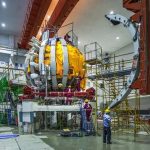Experience-Oriented: Provides 5–7 minutes of weightlessness and panoramic views through 17 windows, targeting leisure travelers.
Lower Cost: Reduced propulsion complexity allows 45% price cuts compared to 2021 (450kvs.450kvs.250k early tickets).
Blue Origin: Vertical Rocket Precision
- Full Automation: The New Shepard system vertically launches to 106 km, achieving 4 minutes of zero-gravity with capsule separation and parachute landing.
- Scientific Edge: Partners with NASA and universities for microgravity experiments, e.g., Rob Ferl’s plant biology study in 2024.
- Premium Pricing: Seats average $1.25 million, appealing to affluent clients and corporate sponsors.
2. Market Strategies and Social Impact
- Democratization Efforts:
- Virgin’s lottery programs enabled a Caribbean mother-daughter duo to fly for $1,800 in raffle fees.
- Blue Origin reserves seats for educators and researchers, like MoonDAO-funded Karsen Kitchen (2024).
- Safety Controversies:
- Virgin Galactic faced scrutiny after a 2014 fatal crash and 2022 FAA investigations into trajectory deviations.
- Blue Origin’s 2022 engine failure delayed flights for 20 months, highlighting technical risks.
- Cultural Shifts: Over 1,200 paid customers (including Olympians and Parkinson’s patients) have redefined astronaut demographics.
3. Future Trajectories and Challenges
- Scalability:
- Virgin aims for monthly flights by late 2025, leveraging New Mexico’s Spaceport America10.
- Blue Origin plans lunar missions with New Glenn rockets, bridging tourism and deep-space exploration.
- Ethical Debates: Critics argue current pricing still excludes 99.9% of humanity, while carbon footprints of rocket launches remain unresolved.
Conclusion
The Virgin Galactic-Blue Origin rivalry has ignited a 3.2billionspacetourismmarket,yettrue”democratization”requiresaddressingcostbarriersandenvironmentalconcerns.Astechnologiesmature,2030mayseesub−3.2billionspacetourismmarket,yettrue“democratization“requiresaddressingcostbarriersandenvironmentalconcerns.Astechnologiesmature,2030mayseesub−200k tickets, making space accessible beyond millionaires and researchers
















